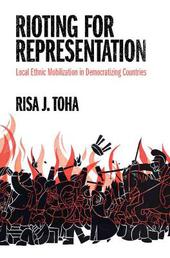
|
Rioting for Representation: Local Ethnic Mobilization in Democratizing Countries
Hardback
Main Details
| Title |
Rioting for Representation: Local Ethnic Mobilization in Democratizing Countries
|
| Authors and Contributors |
By (author) Risa J. Toha
|
| Series | Problems of International Politics |
|---|
| Physical Properties |
| Format:Hardback | | Pages:355 | | Dimensions(mm): Height 235,Width 158 |
|
| ISBN/Barcode |
9781316518977
|
| Classifications | Dewey:363.32309598 |
|---|
| Audience | | Professional & Vocational | |
|---|
| Illustrations |
Worked examples or Exercises
|
|
Publishing Details |
| Publisher |
Cambridge University Press
|
| Imprint |
Cambridge University Press
|
| Publication Date |
4 November 2021 |
| Publication Country |
United Kingdom
|
Description
Ethnic riots are a costly and all too common occurrence during political transitions in multi-ethnic settings. Why do ethnic riots occur in certain parts of a country and not others? How does violence eventually decline? Drawing on rich case studies and quantitative evidence from Indonesia between 1990 and 2012, this book argues that patterns of ethnic rioting are not inevitably driven by inter-group animosity, weakness of state capacity, or local demographic composition. Rather, local ethnic elites strategically use violence to leverage their demands for political inclusion during political transition and that violence eventually declines as these demands are accommodated. Toha breaks new ground in showing that particular political reforms-increased political competition, direct local elections, and local administrative units partitioning-in ethnically diverse contexts can ameliorate political exclusion and reduce overall levels of violence between groups.
Author Biography
Risa Toha is Assistant Professor of Political Science at Yale-NUS College in Singapore. Her work has focused on questions related to political violence, identity, and political economy, appearing in journals such as the British Journal of Political Science, Terrorism and Political Violence, and Journal of Contemporary Southeast Asia.
Reviews'Riots and Representation uses rich data and careful fieldwork in Indonesia to shed new light on the old problem of ethnic conflict during political transitions. Rather than attributing violence to regime, emotions, or economic grievances, Risa Toha shows convincingly that political actors use violence together with other strategies to seek recognition and accommodation during moments of political change.' Tom Pepinsky, Walter F. LaFeber Professor of Government and Public Policy, Cornell University 'All too often, democratic transitions are accompanied by ethnic violence. Risa Toha persuasively argues and meticulously demonstrates that in Indonesia, the largest country to democratize since the Cold War, transitional violence was less an expression of ethnic hatred than of political voice. Her central lesson that young democracies must quickly build new institutions to secure widespread political inclusion should resonate far beyond Indonesia's shores.' Dan Slater, Ronald and Eileen Weiser Professor of Emerging Democracies, University of Michigan 'Risa Toha offers a satisfyingly straight-forward explanation for ethnic rioting across sub-national districts in Indonesia during democratic transition. Accounting for specific features of Indonesia, Toha's parsimonius explanation generates a surprising number of implications, which are tested using a mix of methodological approaches. In this rich account of Indonesian politics, the author reminds us of the importance of a grounded understanding of local politics. This book offers a framework that likely will elucidate sub-national variation of ethnic political rioting across many other ethnically diverse political transitions.' Johanna Kristin Birnir, Professor, Department of Government and Politics, University of Maryland 'What causes inter-group violence in Indonesia and other transitional democracies? Showing why explanations often derived from other institutional contexts just don't work, Risa Toha's new book convincingly demonstrates that violence in Indonesia has been the tactic of local and excluded political groups. The good news, though, is that various tactics of political inclusion have been effective in reducing violence once it breaks out. A must read for all those interested in Indonesia, and in the broader causes of ethnic violence.' Steven Wilkinson, Nilekani Professor of India and South Asian Studies, Yale University
|